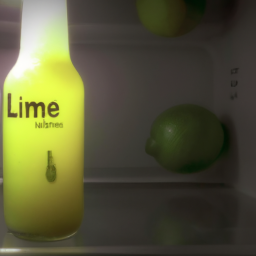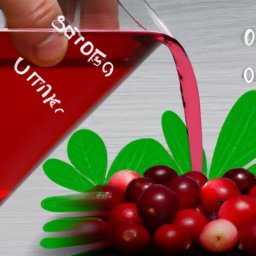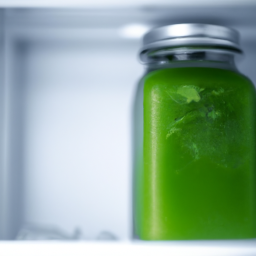Did you know that keeping bottled lime juice in the fridge can extend its shelf life for several months? Indeed! If stored properly, you can enjoy the zesty taste of lime juice long after you first open the bottle. However, it’s important to keep in mind that the freshness of bottled lime juice can vary depending on various factors.
In this article, I’ll be exploring the shelf life of bottled lime juice, how to check if it’s gone bad, and the importance of proper storage. Additionally, I’ll provide tips on how to use up bottled lime juice and alternatives you can consider if you don’t have any on hand.
So, if you’re a fan of lime juice or curious about its shelf life, keep reading!
Key Takeaways
- Proper storage in the fridge can make bottled lime juice last for several months.
- Unopened bottled lime juice can last up to 6 months in the fridge.
- Once opened, it should be used within 2-3 weeks.
- Freezing can extend the shelf life of lime juice.
Understanding the Shelf Life of Bottled Lime Juice
So, how long does bottled lime juice last in the fridge? Well, it all depends on a few key factors. Typically, bottled lime juice can last for up to 6 months in the fridge if it’s unopened.
However, once it’s been opened, the shelf life decreases significantly. In general, you should use the juice within 2-3 weeks after opening to ensure that it’s still fresh and safe to consume.
Aside from using it as an ingredient in cooking, bottled lime juice also has benefits for the skin. It can help to brighten and even out skin tone, as well as reduce the appearance of dark spots and blemishes. To use it for this purpose, simply mix a small amount of lime juice with water and apply it to your face using a cotton ball.
However, it’s important to note that using lime juice on the skin can increase sensitivity to sunlight, so be sure to use sunscreen if you plan to go outside after applying it.
Moving on to signs that bottled lime juice has gone bad…
Signs that Bottled Lime Juice has Gone Bad
If your margarita tastes like sour milk, it’s time to say goodbye to that bottle of lime juice. Like a wilted flower, a bad batch of lime juice can ruin the whole drink. But how can you tell if your bottled lime juice has gone bad?
Here are some signs to watch out for:
-
Change in color: Lime juice should be a pale green or yellowish color. If it starts to turn brown or grey, it’s likely gone bad.
-
Off smell: Fresh lime juice should have a bright, citrusy aroma. If it smells musty or sour, it’s time to toss it.
-
Taste: As mentioned, sour milk is a good comparison for the taste of spoiled lime juice. It may also taste bitter or metallic.
-
Mold: Visible mold or other growths are a clear sign that the juice has gone bad.
Using spoiled lime juice in a drink can not only ruin the taste but also be harmful to your health. Instead of throwing it out, consider using it for cleaning or cooking purposes.
In the next section, we’ll discuss why it’s important to check for spoilage before using bottled lime juice in any recipe.
Importance of Checking for Spoilage
Make sure you check for spoilage before using it, as drinking or cooking with bad lime juice can lead to health problems. It’s important to check the expiration date on the bottle of lime juice before using it.
Expired lime juice can cause gastrointestinal upset, including stomach pain, nausea, and vomiting. In addition to checking the expiration date, it’s also important to look for signs of spoilage. Bad lime juice may have a sour or strange odor and taste, and it may appear cloudy or discolored.
If you notice any of these signs, it’s best to discard the lime juice and not use it in any recipes or drinks. Now that you know the importance of checking for spoilage, let’s move on to some tips for storing bottled lime juice.
Tips for Storing Bottled Lime Juice
When it comes to storing bottled lime juice, there are a few key things to keep in mind to ensure freshness and safety.
First of all, it’s important to properly seal and label the bottle, to prevent air and bacteria from getting in.
Additionally, it’s crucial to avoid cross-contamination by using clean utensils and surfaces when handling the juice.
Finally, freezing lime juice can be a great way to extend its shelf life, but it’s important to do so in a safe and effective manner.
Proper Sealing and Labeling
Properly sealed and labeled, your lime juice can last for weeks in the fridge, giving you plenty of time to whip up your favorite margaritas and guacamole recipes. Proper labeling is important for keeping track of when you opened the bottle and when it should be used by. Additionally, storing your bottled lime juice in the fridge at a consistent temperature of 40°F or below will help maintain its quality. Here are some tips for properly sealing and labeling your bottled lime juice:
| Seal Type | Effectiveness | Notes |
|---|---|---|
| Screw Cap | Good | Easy to open and close, but may not provide an airtight seal |
| Cork | Fair | May allow air in over time, but can be resealed with a stopper |
| Rubber Stopper | Good | Provides an airtight seal, but may be difficult to remove |
Ensuring that your lime juice is properly labeled with the date it was opened and the expiration date will help you keep track of its freshness. Use a permanent marker or label maker to clearly mark the bottle with this information.
To avoid cross-contamination, it’s important to properly clean any utensils or surfaces that come into contact with the lime juice before and after use.
Avoiding Cross-Contamination
To keep your lime juice fresh and safe for consumption, it’s important to prevent cross-contamination. This means ensuring that any utensils or surfaces that come into contact with the lime juice are thoroughly cleaned before use.
One effective method is to use hot, soapy water to clean utensils and a disinfectant spray or wipe to clean surfaces. It’s also important to keep the lime juice container tightly sealed and stored in a separate area of the fridge to prevent any accidental contact with other foods.
Another way to prevent cross-contamination is to use separate utensils for handling the lime juice and other foods. This can be especially important when preparing meals or drinks that require both lime juice and other ingredients.
By being mindful of these cleaning methods and taking precautions, you can ensure that your bottled lime juice stays fresh and free from harmful bacteria. And if you have excess lime juice that won’t be used right away, freezing it can be a great option.
Freezing Lime Juice
To further extend the shelf life of bottled lime juice, one option is to freeze it. Freezing lime juice is a great way to make it last longer and ensure that you always have some on hand for recipes. However, there are certain steps you need to take to properly freeze lime juice.
Firstly, make sure to transfer the lime juice into a freezer-safe container, leaving some extra space at the top for the liquid to expand as it freezes. Secondly, label the container with the date it was frozen to keep track of its freshness. Thirdly, place the container in the freezer and allow it to freeze completely. Lastly, when you’re ready to use it, thaw the lime juice in the refrigerator overnight. Don’t thaw it at room temperature as this can lead to the growth of harmful bacteria.
Here are some uses for frozen lime juice:
- Add it to smoothies for a zesty kick
- Use it to make limeade or margaritas
- Add it to marinades for meats and vegetables
- Use it in salad dressings for a citrus flavor
With the knowledge of how to properly freeze lime juice and the versatility in its uses, you can maximize the shelf life of your bottled lime juice and always have some on hand. So, let’s explore some ways to use up bottled lime juice.
Ways to Use Up Bottled Lime Juice
I’ve found myself with a surplus of bottled lime juice in the fridge, and I’m looking for creative ways to use it up.
One option is to incorporate it into cooking and baking, such as using it in a marinade for grilled chicken or adding it to a key lime pie filling.
Another idea is to mix it into cocktails and drinks, like a refreshing mojito or margarita.
Lastly, bottled lime juice can be a versatile ingredient in marinades and dressings for salads or grilled vegetables.
Cooking and Baking
You can add a hint of lime juice to your cooking and baking for a unique and refreshing flavor. Lime juice is a versatile ingredient that can be used in many recipes as a substitute for other ingredients or as an addition to enhance the flavor. Here are three ways to use bottled lime juice in your cooking and baking:
- Add a splash of lime juice to your marinades for a tangy and zesty flavor.
- Use lime juice in place of vinegar in salad dressings for a fresh and citrusy taste.
- Incorporate lime juice into your baking recipes, such as in a key lime pie or lime flavored cookies.
By using bottled lime juice in your cooking and baking, you can easily add a burst of flavor to your dishes without having to worry about squeezing fresh limes. Plus, it’s a great ingredient to have on hand for cooking substitutions and lime juice recipes.
Moving on to cocktails and drinks, there are many ways to incorporate bottled lime juice for a refreshing and tropical twist to your beverages.
Cocktails and Drinks
If you want to transport yourself to a tropical island, all you need is a cocktail with a splash of lime juice, like a Margarita that’s like a mini-vacation in a glass. But if you don’t have fresh limes on hand, bottled lime juice can be a convenient substitute. The good news is that bottled lime juice can last for a long time in the fridge, making it a reliable ingredient for your cocktail recipes.
To help you better understand how long bottled lime juice can last, here’s a handy table to guide you:
| Type of Lime Juice | Opened Bottle Shelf Life | Unopened Bottle Shelf Life |
|---|---|---|
| Fresh Lime Juice | 2-3 days | 2-3 months |
| Bottled Lime Juice | 6 months | 1 year |
As you can see, bottled lime juice has a longer shelf life than fresh lime juice. However, it’s important to note that the shelf life can vary depending on the brand and preservatives used. Always check the label for any expiration dates or storage instructions to ensure that your bottled lime juice stays fresh for as long as possible.
If you’re in a pinch and don’t have any lime juice on hand, there are also lime juice substitutes that you can use in your cocktails. Lemon juice, orange juice, and grapefruit juice can all be used as substitutes for lime juice, but keep in mind that the flavor profile will be slightly different. Experiment with different substitutes to find the perfect flavor for your cocktail.
Moving on to the next topic, let’s talk about marinades and dressings.
Marinades and Dressings
Nothing beats a delicious marinade or dressing to take your meals to the next level, adding flavor and depth to your favorite dishes. With the use of fresh herbs, spices, oils, and acid, you can whip up your own marinade recipes and salad dressings in no time. The best part? You can customize them to your liking, making them as tangy, spicy, or sweet as you want.
Marinades are perfect for infusing meats, poultry, and fish with flavor before cooking them. A simple marinade can be made with olive oil, garlic, lemon juice, and herbs like rosemary and thyme.
Salad dressings can be made with a variety of ingredients like balsamic vinegar, honey, mustard, and olive oil. Combine them with fresh greens and veggies for a healthy and tasty meal.
Looking for alternatives to bottled lime juice? There are plenty of options available, such as using fresh lime juice, lemons, or other citrus fruits. You can also try using vinegar or different types of fruit juices to add acidity to your dishes.
With a little creativity, you can elevate your meals with fresh and flavorful ingredients.
Alternatives to Bottled Lime Juice
There’s always fresh lime juice as an alternative to bottled lime juice. Making homemade lime juice is quite easy and requires nothing more than fresh limes, a juicer, and a little bit of elbow grease. Simply cut the limes in half and juice them using the juicer.
You can also use a handheld reamer or even squeeze the juice out by hand. If you don’t have fresh limes, there are other fresh lime options available. You can purchase pre-squeezed lime juice from the grocery store, or you can buy frozen lime concentrate and thaw it out in the fridge.
Other types of citrus juices, such as lemon or grapefruit juice, can also be used as a substitute for lime juice in most recipes. So, if you’re in a pinch and don’t have any bottled lime juice on hand, don’t worry – there are plenty of fresh alternatives available.
Other Types of Citrus Juices
Adding variety to your recipes is simple, as other citrus juices like lemon or grapefruit can be used as substitutes for lime juice. Citrus juice substitutions can be made in a variety of recipes, including marinades, dressings, cocktails, and desserts.
Here are some recipe ideas that use other citrus juices:
- Lemon Chicken: Instead of using lime juice in your marinade, try using lemon juice for a tangy and refreshing flavor.
- Grapefruit Margarita: Swap out the lime juice in your margarita recipe for grapefruit juice to add a unique twist to a classic cocktail.
- Orange Cake: Use orange juice instead of lime juice in your cake batter for a citrusy and sweet dessert that will please any crowd.
While lime juice is a popular ingredient in many recipes, don’t be afraid to experiment with other citrus juices. There are plenty of tasty recipes using other citrus juices that can add a new dimension of flavor to your dishes.
Now, let’s explore the benefits of lime juice.
Benefits of Lime Juice
I love using lime juice in my cooking and drinks, not just for its refreshing taste, but also for its numerous health benefits.
Lime juice is a great source of vitamin C, antioxidants, and other nutrients that are essential for maintaining a healthy body.
In addition, lime juice is known to boost immunity, aid digestion, and even improve skin health.
Nutritional Value
Just like a superhero’s secret weapon, bottled lime juice may not have much nutritional value, but it can add a powerful punch of flavor to any dish. It’s a versatile ingredient that can be used in a variety of lime juice recipes, such as marinades, dressings, and cocktails. If you don’t have fresh lime on hand, bottled lime juice is a convenient substitute that can save you time and effort in the kitchen.
While bottled lime juice doesn’t offer the same nutritional benefits as fresh lime juice, it still contains some important vitamins and minerals. It’s a good source of vitamin C, which is essential for a healthy immune system and skin. It also contains small amounts of potassium, magnesium, and calcium.
So, even though bottled lime juice is primarily used for its flavor, it still has some nutritional value that can contribute to your overall health.
Moving on to the next section, let’s explore the health benefits of lime juice in more detail.
Health Benefits
Get ready to reap the health benefits of lime juice as it can help boost your immune system, aid in digestion, and even promote weight loss. Lime juice is packed with Vitamin C, which is essential for a healthy immune system. Drinking lime juice regularly can also help with digestion as it contains citric acid which aids in breaking down food.
Moreover, lime juice has been found to aid in weight loss by reducing appetite and promoting metabolism. When it comes to juicing techniques, lime juice is a great addition to any homemade juice recipe. Adding lime juice to your morning green juice can help balance out the bitterness of leafy greens and add a refreshing flavor.
Lime juice also makes a great addition to any fruit juice recipe, as it enhances the sweetness of fruits like strawberries, watermelon, and pineapple. However, it’s important to note that consuming too much lime juice can lead to tooth enamel erosion. Therefore, it’s important to drink lime juice in moderation and practice good dental hygiene.
Precautions to Consider
Proper precautions prevent prolonged preservation of bottled lime juice in the fridge. While bottled lime juice can be a great ingredient for various recipes, it’s important to keep in mind that it has a limited lifespan in the fridge.
Once opened, bottled lime juice can last up to 2-3 months when stored properly in the refrigerator. However, this doesn’t mean that it’ll retain its full flavor or potency for this entire duration. If you’re planning to use bottled lime juice for your recipes, it’s important to check the expiration date on the bottle and use it within a reasonable time frame.
Additionally, make sure to store it in a cool and dry place, away from direct sunlight or heat sources. If you notice any signs of spoilage, such as a sour smell or mold growth, discard the bottle immediately. By taking these simple precautions, you can ensure that your bottled lime juice stays fresh and safe to use for as long as possible.
Frequently Asked Questions
Can bottled lime juice be frozen for long-term storage?
Yes, bottled lime juice can be frozen for long-term storage using proper freezing methods. To thaw, place in the refrigerator or run under cold water. Avoid leaving at room temperature for too long to prevent spoilage.
Can bottled lime juice be used in place of fresh lime juice in cocktails?
I prefer fresh lime juice in cocktails for its punchy, bright flavor. Bottled lime juice can be used in a pinch, but it lacks the complexities of fresh. Comparing flavor profiles, fresh always wins.
Is there a difference in shelf life between plastic and glass bottled lime juice?
I’ve found that the shelf life of plastic and glass bottled lime juice is generally the same. When considering recycling options and environmental impact, glass is the more sustainable choice. However, cost comparison and availability in stores may vary.
Can bottled lime juice be used for cooking and marinades?
Hey there! I love using bottled lime juice in my recipes. It’s perfect for cooking and marinades, and adds a tangy flavor to any dish. Some recipe ideas include grilled chicken with lime marinade or a refreshing lime vinaigrette for salads.
Are there any health concerns associated with consuming expired bottled lime juice?
Consuming expired bottled lime juice can pose health risks, as bacteria can grow and cause foodborne illness. Always check the expiration date before using and discard if expired.
Conclusion
Well, my friends, I’ve delved deep into the world of bottled lime juice and I can confidently say that this tangy liquid is a true hero in any kitchen.
Not only does it add a burst of flavor to any dish, but it also has numerous health benefits that we can’t ignore. However, we must be vigilant in checking for spoilage and storing it properly to fully enjoy its benefits.
Let’s be real, the thought of wasting precious bottled lime juice is enough to make any foodie cringe. So, take my advice and make sure you keep an eye out for any signs of spoilage. Trust me, you don’t want to be stuck with a funky smelling and tasting bottle of juice that’s well past its prime.
Remember to store it in the fridge and use it up within a reasonable amount of time.
Overall, bottled lime juice is a staple ingredient that no kitchen should be without. So, if you haven’t already stocked up, what’re you waiting for? Grab a bottle and let the tangy goodness add some zest to your life!
Ilana has been a vegan for over 10 years. She originally made the switch for health reasons, but soon found herself becoming more and more passionate about the ethical and environmental implications of a vegan lifestyle. Ilana is the author of The Graceful Kitchen, a blog all about veganism. She loves to cook up delicious and nutritious vegan meals, and share her recipes with others who are interested in leading a cruelty-free life. Ilana is also a strong advocate for using whole foods as the foundation of a healthy diet, and believes that going vegan is one of the best ways to achieve this.










